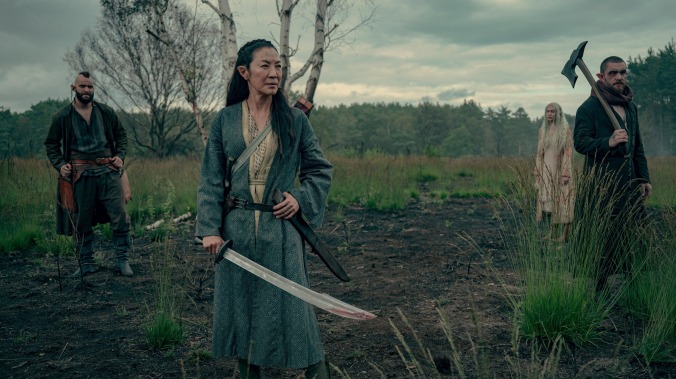The Witcher: Blood Origin review: This Netflix prequel could use a hell of a lot more witcher
Live-action miniseries has Michelle Yeoh and big teases for fans—but not enough beyond that

It’s been said many times before (on this very website, even), but the thing that makes the Witcher saga special in its various incarnations—the original books, the video games, Netflix’s live-action adaptation—is the eponymous monster-hunting “witcher” himself. Though he is very much a part of the high-fantasy world that birthed him, Geralt Of Rivia prides himself on not being a traditional fantasy hero even as the evidence disproving that argument continues to stack up. He’s clever and sarcastic and unpretentious in a way that takes the self-serious edge off of the fantasy genre, allowing the audience to be in on the joke, so to speak, when a Witcher story plays with fantasy tropes.
Netflix’s live-action prequel miniseries, The Witcher: Blood Origin, doesn’t really have any of that. It’s set thousands of years before the events of the main series, centering around an important lore event called the Conjunction Of The Spheres, but without the anchor that keeps the franchise grounded, it really is just a fantasy story without any of the things that make The Witcher special. It’s House Of The Dragon without the political maneuvering or family drama that makes Game Of Thrones so captivating. It’s Rings Of Power without the class and grandeur of Tolkien. It’s … The Witcher without the witcher.
Which is not to say that it’s unwatchable. Coming in at only four episodes, most of which feature the great Michelle Yeoh and a cast of surprisingly engaging (if not wholly fleshed out) adventurers, it doesn’t really require a big investment—and at the end of the day you still get to see someone become a proto-witcher and watch them destroy a big monster. The fight scenes are well done (even when a ton of CG is involved), and the costumes and general art design are both impressive and varied. It’s just that there isn’t really anything going on that you won’t find a better version of in the regular Witcher series or some other fantasy story.
The show centers on what can only be described as a fellowship going on a quest to avenge various betrayals. Each character basically fits into a kind of Dungeons & Dragons archetype, with one or two little quirks to make them memorable: The elf warrior who abandoned the life of bloodshed to become a protest singer. The swordmaster who has a reason to be pissed at everyone so you don’t really know if you should trust her. The magic guy who accidentally helped the bad guys. The dwarf fighter who gleefully rushes into battle with a hammer made from the ashes of her dead lover. The problem isn’t anyone in the fellowship; it’s that there is a fellowship at all. It’s the sort of obvious fantasy story beat that the regular Witcher would poke fun at—and book readers will know that the series does poke fun at the concept of this kind of D&D party, and it’s much smarter and funnier than anything that happens in Blood Origin.
Weirdly, the events of Blood Origin—despite being hugely important to the universe of The Witcher and just hinted at in Andrzej Sapkowski’s books—were almost entirely invented just for this show. Going back to House Of The Dragon, it’s like if Game Of Thrones spent a lot of time talking about dragons without ever showing them, and then finally there was this prequel series that was loaded with them. The stuff in Blood Origin should be exciting for Witcher fans, but it all feels vaguely inevitable, like none of the little moments really matter until the big thing happens. (Again: The big thing is the Conjunction Of The Spheres, an event mentioned on The Witcher in which the worlds of man, elves, and monsters were merged into one. That’s the premise of the show, not a spoiler.)
That makes it even weirder when certain characters show up with certain names that fans of the Witcher books and games will recognize, but that people who have only seen the show will most likely not even notice. Ithlinne, Avallac’h, and Eredin are people who are very important to this world in various ways, but they don’t really do much in Blood Origin—which means they’re either here as little nods to the lore for fans or they’re just setting up what’s going to happen in future seasons of The Witcher. One of those three is very explicitly here just for that latter purpose, as underlined by a scene that feels very reminiscent of a post-credits stinger in a Marvel movie—fans of having to explain the significance of a seemingly insignificant thing will get a kick out of this.
In that sense, Blood Origin is fairly interesting as a tease for what’s going to happen next on The Witcher (whenever it comes back for a final season with Henry Cavill in the lead, before switching to Liam Hemsworth), but that tease is only going to register for people who already have some sense of what’s going to happen next on The Witcher. It’s more interesting than, say, an exposition dump explaining the Conjunction Of The Spheres would’ve been, especially if people like Avallac’h and Eredin do become more important later on. But that’s not saying a whole lot.
The Witcher: Blood Origin premieres December 25 on Netflix.